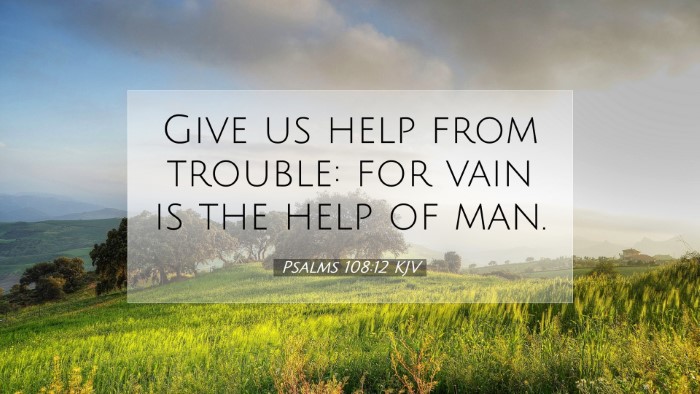Commentary on Psalm 108:12
Psalms 108:12 states: “Give us help from trouble: for vain is the help of man.” This verse reflects a profound and universal truth that resonates powerfully within the human experience. This commentary seeks to explore the depth of these words through insights gathered from respected public domain sources.
Contextual Overview
This psalm is a composition attributed to David and is remarkable for its dual structure, merging two previous psalms (Psalms 57 and 60). Psalms 108 captures a moment of both distress and hope, revealing the human condition when faced with overwhelming challenges. David acknowledges the futility of relying solely on human strength and capabilities in times of crisis. This resonates deeply with the experiences of believers, affirming the necessity of divine assistance.
The Need for Divine Help
- Human Limitations: Albert Barnes elaborates on the fragility of human endeavors. He notes that even the most capable and seemingly strong individuals and groups ultimately fall short when confronted with significant adversity.
- Desperation in Prayer: Matthew Henry highlights that the psalmist is driven to God in prayer by the awareness of human inability. This evokes a deeper reliance on God, fostering a relationship rooted in trust and faith.
- Empowering Faith: Adam Clarke comments that the recognition of “vain is the help of man” serves to strengthen faith in God. It invites believers to place their confidence solely in God’s omnipotence rather than in fallible human hands.
Expressions of Trust
The psalmist’s cry for help is both a lament and a declaration of faith. By stating “Give us help from trouble,” David directly appeals to God’s sovereignty and power. His plea reinforces the belief that while human resources may fail, God remains a constant source of refuge and strength.
- Trust in Divine Sovereignty: Henry points out that the believer's trust must shift towards the sovereignty of God, as He is depicted as the omnipotent rescuer capable of delivering from every form of peril.
- Intercessory Nature: Barnes emphasizes that this verse serves as an intercessory prayer, meant not only for personal struggles but for the collective struggles of the community. It highlights the importance of communal prayer in times of distress.
Contrasting Human Efforts
Human efforts, while sometimes noble, ultimately prove ineffective when faced with the trials that life presents. The phrase “vain is the help of man” starkly contrasts the divine help that the psalmist seeks.
- Inevitability of Failure: Clarke remarks that this statement reaffirms the inevitability of failure when leaning solely on human support. He encourages believers to recognize the limitations inherent in human counsel and intervention.
- Divine Capability: Henry emphasizes that God’s help is never in vain. When we lean on God, there is an assurance that His resources are sufficient to meet every need.
Application for Believers
This verse invites believers to reflect on their reliance on God versus their reliance on humans. In pastoral ministry, teaching on this verse can provide comfort and wisdom for those struggling with dependence on others.
- Encouragement in Crisis: Pastors can draw on this commentary to encourage congregants facing crises to seek God’s help rather than solely depending on mortal support.
- The Role of Prayer: This psalm serves as a powerful reminder of the need for fervent prayer in the life of a believer. It is a call to unite in prayer, appealing to God as the source of help.
- Teaching Opportunities: This text offers rich material for sermon preparation, illustrating God's faithfulness in the face of human inadequacy, a vital theological point worth exploring in teachings.
Conclusion
Psalms 108:12 beautifully encapsulates the human condition and its relationship with divine providence. The fusion of desperation and faith invites every believer to lean not on their understanding but to turn to God as the ultimate source of help. As students and theologians reflect on this verse, they should draw strength from its implications, encouraging a life that places God at the center of every petition and need.


